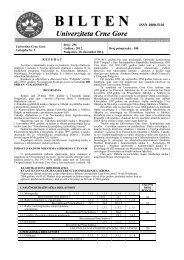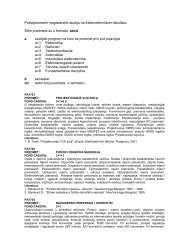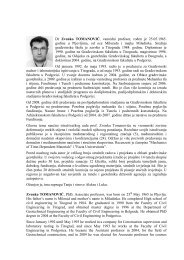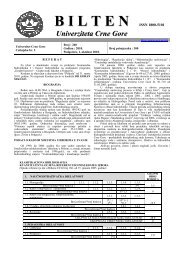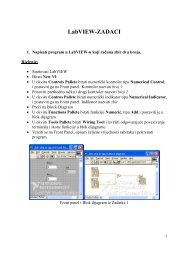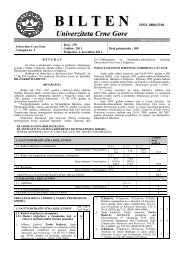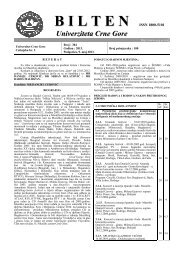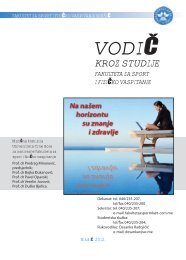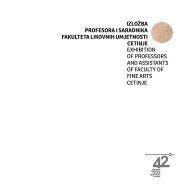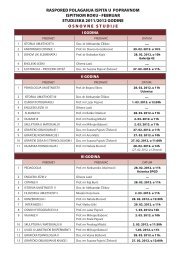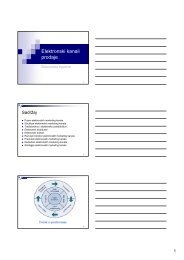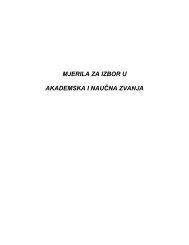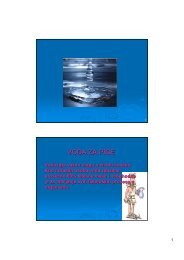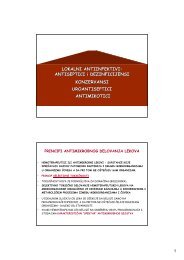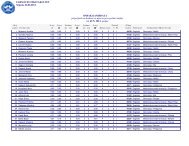WHO monographs on selected medicinal plants - travolekar.ru
WHO monographs on selected medicinal plants - travolekar.ru
WHO monographs on selected medicinal plants - travolekar.ru
Create successful ePaper yourself
Turn your PDF publications into a flip-book with our unique Google optimized e-Paper software.
<str<strong>on</strong>g>WHO</str<strong>on</strong>g> <str<strong>on</strong>g>m<strong>on</strong>ographs</str<strong>on</strong>g> <strong>on</strong> <strong>selected</strong> <strong>medicinal</strong> <strong>plants</strong><br />
of carnosol) to rats, 1 hour after treatment of the animals with carb<strong>on</strong><br />
tetrachloride (CCl 4<br />
), fully prevented CCl 4<br />
-induced lipid peroxidati<strong>on</strong> in<br />
the liver. The CCl 4<br />
-induced increase in plasma bili<strong>ru</strong>bin c<strong>on</strong>centrati<strong>on</strong>s<br />
and alanine aminotransferase activity was completely normalized after<br />
treatment with the extract. The treatment also resulted in a significant<br />
recovery from CCl 4<br />
-induced decrease in liver glycogen c<strong>on</strong>tent. The extract<br />
also increased liver cytosolic reduced glutathi<strong>on</strong>e activity and produced<br />
an additi<strong>on</strong>al increase in plasma glutathi<strong>on</strong>e activity in rats treated<br />
with CCl 4<br />
. Histological evaluati<strong>on</strong> showed that the extract partially prevented<br />
CCl 4<br />
-induced inflammati<strong>on</strong>, necrosis and vacuolati<strong>on</strong> (16).<br />
The hepatoprotective and antimutagenic effects of an ethanol extract<br />
of the leaves were investigated using CCl 4<br />
and cyclophosphamide as the<br />
hepatotoxic and mutagenic compounds. The results indicated that intragastric<br />
administrati<strong>on</strong> of the ethanol extract (1.5 g/kg bw) to rats for<br />
3 weeks produced a pr<strong>on</strong>ounced hepatoprotective effect as compared<br />
with silymarin (reference compound) due to the ameliorati<strong>on</strong> of most of<br />
the se<strong>ru</strong>m and liver parameters studied and c<strong>on</strong>firmed by histopathological<br />
examinati<strong>on</strong> of the liver tissue. Pretreatment of mice for 7 days with<br />
the essential oil (1.1 mg/g bw) followed by intraperit<strong>on</strong>eal administrati<strong>on</strong><br />
of cyclophosphamide significantly reduced the induced mitodepressi<strong>on</strong><br />
in the b<strong>on</strong>e marrow cells of the animals (17).<br />
Anti-inflammatory activity<br />
Treatment of mouse macrophage RAW 264.7 cells with carnosol markedly<br />
reduced lipopolysaccharide-stimulated nitric oxide producti<strong>on</strong> in a<br />
c<strong>on</strong>centrati<strong>on</strong>-related manner with an IC 50<br />
of 9.4 μM. Western blot, reverse<br />
transcripti<strong>on</strong>–polymerase chain reacti<strong>on</strong>, and northern blot analyses<br />
dem<strong>on</strong>strated that carnosol decreased lipopolysaccharide-induced<br />
inducible nitric oxide synthase mRNA and protein expressi<strong>on</strong>. Carnosol<br />
treatment reduced the translocati<strong>on</strong> of nuclear factor-kappa B subunits<br />
and the binding activity of nuclear factor-B DNA in activated macrophages.<br />
Carnosol also inhibited inducible nitric oxide synthase and<br />
nuclear factor-B promoter activity in a transient transfecti<strong>on</strong> assay. These<br />
activities were due to down-regulati<strong>on</strong> of inhibitor B kinase activity by<br />
carnosol (5 μM), which in turn inhibited lipopolysaccharide-induced<br />
phosphorylati<strong>on</strong> as well as degradati<strong>on</strong> of inhibitor B. Carnosol also inhibited<br />
lipopolysaccharide-induced p38 and p44/42 mitogen-activated<br />
protein kinase activati<strong>on</strong> at a higher c<strong>on</strong>centrati<strong>on</strong> (20 μM). These results<br />
suggest that carnosol suppresses producti<strong>on</strong> of nitric oxide and inducible<br />
nitric oxide synthase gene expressi<strong>on</strong> by inhibiting activati<strong>on</strong> of nuclear<br />
factor-B, and provide possible mechanisms for its anti-inflammatory<br />
activity (18).<br />
298



